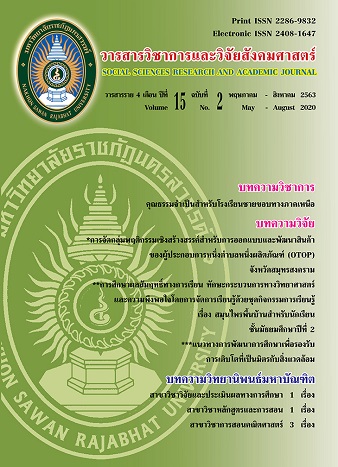การวิจัยเชิงปฏิบัติการเพื่อพัฒนาความสามารถในการให้เหตุผลเชิงวิทยาศาสตร์ โดยการจัดการเรียนรู้ด้วยรูปแบบการสืบสอบแบบแนะแนวทาง เรื่อง กรด-เบส สำหรับนักเรียนชั้นมัธยมศึกษาปีที่ 5 Action Research to Develop Scientific Reasoning Ability of Grade 11 Students in The Topic of Acid-Base by Using Guided Inquiry Model
Main Article Content
Abstract
การวิจัยเชิงปฏิบัติการนี้มีวัตถุประสงค์เพื่อ 1) ศึกษาแนวทางการจัดการเรียนรู้ด้วยรูปแบบการสืบสอบแบบแนะแนวทาง ที่พัฒนาความสามารถในการให้เหตุผลเชิงวิทยาศาสตร์ 2) ศึกษาผลของการพัฒนาความสามารถในการให้เหตุผลเชิงวิทยาศาสตร์ในการจัดการเรียนรู้ด้วยรูปแบบการสืบสอบแบบแนะแนวทาง และ 3) ศึกษาความพึงพอใจของนักเรียนที่มีต่อการจัดการเรียนรู้ด้วยรูปแบบการสืบสอบแบบแนะแนวทาง เรื่อง กรด-เบส ของนักเรียนชั้นมัธยมศึกษาปีที่ 5 กลุ่มเป้าหมาย คือ นักเรียนชั้นมัธยมศึกษาปีที่ 5 จำนวน 25 คน ภาคเรียนที่ 2 ปีการศึกษา 2562 โรงเรียนเจียงทองพิทยาคม การวิจัยใช้รูปแบบการวิจัยเชิงปฏิบัติการตามวงจร PAOR 4 ขั้นตอน ต่อเนื่องกัน 4 วงจรปฏิบัติการ เครื่องมือที่ใช้ในการวิจัย ได้แก่ แผนการจัดการเรียนรู้ แบบบันทึกหลังการจัดการเรียนรู้ ใบกิจกรรม อนุทินของนักเรียน รายการผลการสำรวจตรวจสอบของนักเรียน แบบทดสอบความสามารถในการให้เหตุผลเชิงวิทยาศาสตร์ และแบบสอบถามความพึงพอใจ วิเคราะห์ข้อมูลเชิงคุณภาพด้วยวิธีการวิเคราะห์เนื้อหา ส่วนข้อมูลเชิงปริมาณวิเคราะห์ด้วยสถิติบรรยาย
ผลการวิจัย พบว่า 1. การจัดการเรียนรู้ด้วยรูปแบบการสืบสอบแบบแนะแนวทาง ประกอบด้วย 6 ขั้นตอน ได้แก่ ขั้นการกำหนดสถานการณ์หรือปัญหา ขั้นสำรวจและเก็บรวบรวมข้อมูล ขั้นตั้งสมมติฐานและลงมือปฏิบัติ ขั้นวิเคราะห์ข้อมูล ขั้นการสร้างข้อสรุป และขั้นขยายความรู้ ในแต่ละขั้นตอนครูผู้สอนควรให้ความสำคัญและใช้คำถามเพื่อกระตุ้นให้นักเรียนเข้าใจและรับรู้ปัญหา รวบรวมหลักฐาน คาดการณ์สิ่งที่เกิดขึ้น จนนำไปสู่การลงข้อสรุป โดยใช้หลักฐานหรือข้อมูลที่มีความสมเหตุสมผล 2. ความสามารถในการให้เหตุผลเชิงวิทยาศาสตร์ของนักเรียนหลังการจัดการเรียนรู้ด้วยรูปแบบการสืบสอบแบบแนะแนวทางเรื่อง กรด-เบส อยู่ในระดับสูง 3. ความพึงพอใจของนักเรียนหลังการจัดการเรียนรู้ด้วยรูปแบบการสืบสอบแบบแนะแนวทาง เรื่อง กรด-เบส
The purpose of this action research were 1) to investigate the guideline of learning management by using guided inquiry model to develop scientific reasoning ability, 2) to investigate the effects of using guided inquiry model to develop scientific reasoning ability, and 3) to study the satisfactions of grade 11 students to the guided inquiry model in the topic of acid-base. The targeted group were 25 students in grade 11 from Jiengthongpittayakom school in the second semester of 2019 academic year. In this research, action research was employed. As thus, a PAOR cycle was run for four continuous research cycles. The research instruments were lesson plan, the field note of student learning record, work sheets, the student's reflection, the student's investigation report, the scientific reasoning ability test, and the satisfaction questionnaire. Qualitative data were analyzed by content analysis and quantitative were analyzed by using descriptive statistic.
The result reveals that: 1. The guideline of learning management by using guided inquiry model to develop scientific reasoning ability are consists of six steps as follows: discrepant event and confronting the problem, data gathering, generating hypotheses and experimenting, analysis, conclusion and extension. Each step in this model must teachers should focus and use questions to encourage students to understand and recognize problems, data gathering, generating hypotheses until to the conclusion by using reasonable evidence 2. Students’ scientific reasoning ability after using guided inquiry model were at a high level. 3. Students’ satisfactions after using guided inquiry model were at a hight level.
Article Details
References
ภัทราวรรณ ไชยมงคล. (2559). การวิจัยปฏิบัติการเพื่อพัฒนาความสามารถในการให้เหตุผลเชิงวิทยาศาสตร์ เรื่อง ปริมาณสารสัมพันธ์ ของนักเรียนชั้นมัธยมศึกษาปีที่ 4 ด้วยรูปแบบการสืบเสาะที่ขับเคลื่อนด้วยกลวิธีการโต้แย้ง. ปริญญาการศึกษามหาบัณฑิต. มหาวิทยาลัยนเรศวร, พิษณุโลก.
ภพ เลาหไพบูลย์. (2557). แนวการสอนวิทยาศาสตร์. กรุงเทพฯ: ไทยวัฒนาพานิช.
สถาบันส่งเสริมการสอนวิทยาศาสตร์และเทคโนโลยี. (2558). รายงานผลการวิจัยโครงการ TIMSS 2015 วิชาวิทยาศาสตร์. สืบค้นเมื่อ 9 ธันวาคม 2562, จาก http://timssthailand.ipst.ac.th/?p=145
สถาบันส่งเสริมการสอนวิทยาศาสตร์และเทคโนโลยี. (2560). ผลการประเมิน PISA 2015 บอกอะไรถึงระดับนโยบาย. Focus ประเด็นจาก PISA, 14, 1-4.
สำนักงานคณะกรรมการพัฒนาการเศรษฐกิจและสังคมแห่งชาติ. (2560). แผนพัฒนาเศรษฐกิจและสังคมแห่งชาติ ฉบับที่ 12 พ.ศ. 2560 – 2564. สืบค้นเมื่อ 9 ธันวาคม 2562, จาก http://www.nesdb.go.th/ewt_dl_link.php?nid=6422
เสาวรัตน์ รามแก้ว. (2552). ผลของการจัดกิจกรรมการเรียนรู้คณิตศาสตร์โดยใช้การสืบสอบแบบแนะแนวทาง ที่มีผลต่อมโนทัศน์และความสามารถในการให้เหตุผลทางคณิตศาสตร์ของนักเรียนชั้นมัธยมศึกษาปีที่ 2. ปริญญาครุศาสตรมหาบัณฑิต. จุฬาลงกรณ์มหาวิทยาลัย, กรุงเทพฯ.
วิไลวรรณ ตรีศรี ชะนะมา. (2537). แนวคิดบางประการที่เกี่ยวกับแนวคิดรอบยอด . สารพัฒนาหลักสูตร. 49-51.
Bell, F. H. (1981). Teaching and Learning Mathematics In Secondary Schools. 2nd ed. Lowa USA: Wm.C. Brown Company Publishers.
Geddis, A. N. (1991). Improving the quality of science classroom discourse on controversial issues. Science Education, 75(2), 169-183.
Gerber, B. L., Cavallo, A. M., & Marek, E. A. (2001). Relationships among informal learning environments, teaching procedures and scientific reasoning ability. International Journal of Science Education, 23:5, 535-549.
Gialamas, S., Keller, S., Cherif,A., and Hansen, A. (2000). Using Guided Inquiry in Teaching Mathematical Concepts. In lllinois Mathematics Teacher. Retrieved January 5, 2020, from http://abourcherif.com/pdfs/Guided.pdf
Kemmis, S., and McTaggart, M., Eds. (1988). The Action Research planner. Victoria, Australia: Deakin University.
Lawson,A. E. (2009). Basic inferences of scientific reasoning, argumentation, and discovery. Science Education, 94(2), 336-364.
Sampson, V. and Gleim, L. (2009). Argument-driven inquirt to promote the understanding of important concepts and practices in biology. The American Biology Teacher, 71(8), 465-472.
Sampson, V., Grooms, J., and Walker, J.P. (2013). Argument-Driven Inquiry as a way to help student learn how to participate in scientific argumentation and craft Written Arguments: An Exploratory Study. Science Education, 95(2), 217-257.


